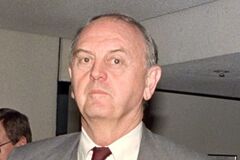Jeremy Shearer
(Diplomat) | |
|---|---|
 | |
| Born | Jeremy Brown Shearer 4 October 1931 Queenstown, South Africa |
| Alma mater | University of Stellenbosch |
Jeremy Shearer was born on the 4 October 1931 in Queenstown, South Africa and obtained his LLB at the University of Stellenbosch in 1953.
Contents
Diplomat
Working for the South African Ministry of Foreign Affairs from the 1950s, Jeremy Shearer was posted as a diplomat to a number of European countries and the US, and represented South Africa at a variety of international conferences.
Abduction of Archibald Dunn
Extract from "Russian Roulette: The Life and Times of Graham Greene":
"At the beginning of 1980 Graham Greene was asked to help resolve a kidnapping in El Salvador. He received a late-night call from the South African chargé d'affaires in Paris, Jeremy Shearer, who asked for his help in securing the release of Archibald Gardner Dunn, the country's ambassador to El Salvador who had been abducted on 28 November 1979. The ransom demands were extreme and they didn't know who was holding Dunn. The South Africans would have had to swallow some pride to seek help from the author of "The Human Factor", but Shearer seems to have liked and admired Greene."
Graham Greene had dinner with Jeremy Shearer in Antibes, and proceeded to visit El Salvador and raised the case at a high level.
"On 8 October 1980, the guerrillas issued a communiqué to say that Dunn had been executed. Sources however told a quite different story that the ambassador, already sick, had died in captivity. In that scenario, the communiqué was an attempt to salvage a little value from the kidnapping: the guerrillas could pretend to have followed through on their threats. Jeremy Shearer inclined to this view, as did Greene."[1]
Ambassador to the UN
Jeremy Shearer became Permanent Representative of South Africa to the United Nations, where he presented his credentials to then Secretary-General Javier Perez de Cuellar at the UN headquarters in New York in August 1988.
Retirement
He retired from the Department of Foreign Affairs on the 30 April 1994.[2]
Related Document
| Title | Type | Publication date | Author(s) | Description |
|---|---|---|---|---|
| Document:Lucky Escapees from Pan Am Flight 103 | Article | 20 October 2018 | Christopher Nicholson | In this article, Judge Nicholson analyses in forensic detail conflicting claims that former foreign minister Pik Botha had been booked to travel on the doomed Pan Am Flight 103 which exploded over Lockerbie, Scotland, on 21 December 1988. The Judge's analysis concludes by asking whether UN Commissioner for Namibia Bernt Carlsson "was not the real target of those who put the bomb on Pan Am 103." |